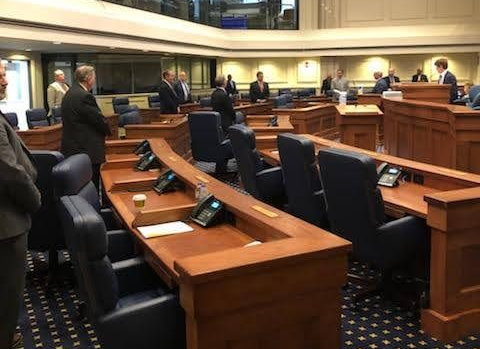Senate Committee advances legislation to bar protests at individual residences

On Thursday, the Alabama Senate Veterans and Military Affairs Committee voted to advance legislation prohibiting protests and picketing outside individual residences. Senate Bill 199 is sponsored by State Senator Arthur Orr (R-Decatur). Orr said that this legislation was inspired by the protests outside of Justice Brett Kavanaugh’s house following the release of a draft opinion overturning the Roe v. Wade decision. Orr said, “Protesters come out to the house and protested on the sidewalk with bullhorns and created a nuisance.” Orr said that he felt that the state of Alabama did not want that, so he drafted legislation to ban such tactics. “I showed it to Judiciary Chairman [Will] Barfoot, and he had some ideas,” Orr said. Sen. Will Barfoot said, “No person at or near a person’s residence. I think that is pretty vague. I think we need to tighten that up.” Sen. Andrew Jones is the Chairman of the Senate Veterans and Military Affairs Committee. The synopsis states, “This bill would prohibit a person from picketing or protesting at or near the residence of any individual intending to harass or intimidate. This bill would require law enforcement officers to ask a person who is protesting to peacefully leave the premises before placing that person under arrest.” This offense would be a class C misdemeanor. If local law enforcement can’t or won’t enforce this statute, it authorizes the Alabama Law Enforcement Agency to do so. This legislation would allow municipalities or counties to adopt ordinances or resolutions to regulate the time and noise level of any picketing or protesting in a residential area and provide criminal penalties for violations.” The committee voted to give SB199 a favorable report. It could be considered by the full Senate as early as Tuesday. While the protests outside of Supreme Court Justices’ homes made national news, there have been instances of protests outside of individual residences in Alabama. Protesters protested outside the home of Hoover Mayor Frank Brocato following the shooting of Emantic “E.J.” Bradford Jr. in the Galleria Mall by a Hoover police officer. In the case of the Supreme Court Justices, legal experts generally agree that targeted, stationary protests outside of a justice’s home are already prohibited under federal law — an effort to protect judges from undue pressures or influence. U.S. Sen. Katie Britt and other Republicans maintain that the Biden administration ordered the federal marshals to protect the judges but not to remove the protestors. Tuesday will be day 11 of the 2023 Alabama Regular Legislative Session. The Alabama Constitution limits the Legislature to no more than thirty legislative days during a regular session. To connect with the author of this story or to comment, email brandonmreporter@gmail.com.
Senate committee advances bill to help local governments finance road projects

On Thursday, the Alabama Senate Transportation and Energy Committee voted to advance legislation designed to help local governments borrow funds to finance road and bridge projects. Senate Bill 205 is sponsored by State Senator Arthur Orr. SB205 deals with the Alabama Transportation Infrastructure Bank (ATIB), a program maintained by the Alabama Department of Transportation. The ATIB program aims to provide local government units with an alternative financing source for funding needs related to the construction and improvement of highway and transportation facilities. The program aims to help counties and cities finance projects at a reduced rate by issuing revenue bonds. SB205 would increase the number of projects eligible for ATIB financing. According to the synopsis, “Under existing law, the Alabama Transportation Infrastructure Bank is a public corporation that exists to select and assist in financing major qualified projects by providing loans and other financial assistance to government units for constructing and improving highway and transportation facilities necessary for public purposes. This bill would include additional entities, including tax increment districts, Alabama improvement districts, and cooperative improvement districts, as government units that may receive loans or financial assistance from the bank. “Under existing law, the minimum project cost to be eligible for assistance from the bank is $5,000,000. This bill would reduce the minimum project cost to be eligible for assistance from the bank to $1,000,000. This bill would further provide for the bank’s annual reporting requirements.” Sen. Orr said the current floor for financing these projects is $5 million. This bill would lower that floor to $1 million. Orr said the Alabama Transportation Infrastructure Bank “allows them (local governments) to use the state’s borrowing credit rating to get lower rates than they could otherwise get.” This saves money on financing costs. “For those of you who represent more rural, less sophisticated counties, please make an effort to get this out there,” Orr explained. “As interest rates tick up, it is going to get more and more important to save money there,” Orr told the Committee. The Transportation and Energy Committee is chaired by Senator Gerald Allen. Allen cosponsored SB205. The Committee voted to give SB205 a favorable report. The legislation could be considered by the full Senate as early as Tuesday. Tuesday will be day 11 of the 2023 Alabama Regular Legislative Session. To connect with the author of this story or to comment, email brandonmreporter@gmail.com.
Adoption bill passes Senate with vaccination amendment attached

On Thursday, the Alabama Senate passed legislation simplifying Alabama’s complex adoption laws, speeding up the process of children finding permanent homes. The Senate included an amendment that would allow families with vaccine skepticism to be able to be involved in the foster care program. House Bill 101 is sponsored by State Rep. Ginny Shaver. The adoption reform legislation was carried in the Alabama Senate by State Senator Arthur Orr. “This is a Law Institute (ALI) bill,” Shaver said when the bill was in committee. “I started working on a bill and found out that they already had a committee working on rewriting the state’s adoption code.” Shaver explained that the Alabama Law Institute had a committee of judges and lawyers who met on a conference call every two weeks for the last four years to modernize and improve Alabama’s existing adoption statutes. “Alabama’s adoption law has not been touched in 30 years,” Shaver said. The rewritten 80-page bill “is very comprehensive and detailed.” Shaver said that the new legislation divided minor adoptions versus adult adoptions. It also clarifies which court is the proper court, allows courts handling adoptions to work together and communicate, allows for electronic communication, provides rules for a contest of adoptions in certain situations, and clarifies procedures about relatives and stepparents who adopt a minor. Orr did add some amendments in the Senate. The first was a “technical amendment” and came from ALI and Shaver. “This came from ALI and Rep. Shaver, the sponsor,” Orr explained. “It cleaned up some wording about grandparents.” The second amendment deals with vaccinations and was negotiated by Orr with the Alabama Department of Human Resources (DHR). “I spent a good while talking to Commissioner [Nancy] Buckner, and she and the Department support this,” Orr said. “It is not the same amendment that was offered in the House that there was some controversy about.” “The Department of Human Resources shall provide by rule the process through which an individual seeking to participate in foster care or adoption may apply for an exemption from any vaccination requirement for religious or other appropriate reason for himself, herself, or any other individual in his or her household.” The Senate adopted both of the amendments. “This has been a long time coming,” Orr said of the legislation. “We will move children more rapidly through the process of adoption and will remove needless hurdles.” Sen Rodger Smitherman said, “I want to commend ALI. ALI is a collection of legal minds from all over the state.” “I am on the ALI board of directors, so I got to see the committee work on this,” Smitherman said. Orr said that the legislation has “lots of changes” to Alabama’s adoption laws “that will certainly expedite the process.” “I would like to thank DHR. They have a lot of challenges,” Orr said. The Senate voted to pass HB101 30 to 0. The legislation now goes back to the Alabama House of Representatives for them to consider the changes that were made by the Senate. The Legislature will return on Tuesday for the 11th legislative day of the 2023 Alabama Regular Legislative Session. To connect with the author of this story or to comment, email brandonmreporter@gmail.com.
Alabama legislature advances Governor’s “Gameplan” economic incentives package

On Thursday, both the Alabama House of Representatives and the Senate voted in favor of portions of Alabama Governor Kay Ivey’s “Game Plan” legislative package. “The Game Plan will position Alabama for a new era of vigorous growth, allowing us to continue our record-breaking economic development success while providing new levels of support for the state’s innovation economy,” said Gov. Ivey. “This package will benefit all Alabamians, those living in both urban centers and rural areas, and ensure our citizens are ready for high-paying careers.” “The Game Plan — our plan for Alabama’s continued economic success — had great momentum today in the Alabama Legislature,” Ivey wrote on Twitter. “I commend both the Senate and House for their work on this package of bills and look forward to their final passage. Let’s keep Alabama winning!” The House passed four-game plan bills on Thursday, while the Senate passed two more. The legislation from each now has to be considered by the second House. House Bill 257 (HB257) is sponsored by State Rep. Danny Garrett. HB257 creates the Alabama Site Development Fund. This legislation authorizes the State Industrial Development Authority to make site assessment grants and site development grants to private companies. The bill also provides for the criteria that must be met for grant approval, including changes to criteria based on economic conditions. It limits the funding that may be received by any site under the grant program. HB257 passed the House 105 to 0. HB257 has been referred to the Senate Fiscal Responsibility and Economic Development Committee, which is chaired by Sen. Garlan Gudger. Senate Bill 165 is sponsored by State Sen. Arthur Orr. It also addresses the creation of the Alabama Site Development Fund. SB165 appears to be the Senate version of HB257. SB165 passed the Senate by a vote of 30 to 0. The legislation has been referred to the House Ways and Means Education Committee – which Garrett chairs. House Bill 241 (HB241) is also sponsored by Garrett. HB241 extends the Alabama Jobs Act sunset date to July 31, 2028. It also increases the annualized cap on outstanding Alabama Jobs Act incentives by $25 million yearly for five up to $475 million. The bill increases the investment tax credit transfer time to provide that the first five years of the investment credit may be transferred by the incentivized company and applied by another person or company under the Alabama Jobs Act. It also extends the Growing Alabama Act sunset date to July 31, 2028, while increasing the annual cap on funding approved pursuant to the Growing Alabama Act incrementally to $35 million. The legislation transfers certain programs from the Growing Alabama Act to Innovate Alabama and creates the Sweet Home Alabama Tourism Investment Act. The Alabama Tourism Department is tasked with developing standards for the review and approval of certified tourism destination projects. HB247 passed the House 105 to 0. It has been referred to the Senate Finance and Taxation Education Committee, which Sen. Orr chairs. Senate Bill 151 (SB151) is sponsored by Sen. Garlan Gudger. SB151 would amend existing law on economic development to authorize the Joint Legislative Advisory Committee on Economic Development to conduct an economic incentive evaluation. It would also require the Department of Commerce to publish certain information regarding economic development incentives awarded under the Alabama Jobs Act. SB151 Passed the Senate 30 to 0. The legislation has been referred to the House Ways and Means Education Committee. House Bill 247 is sponsored by House Minority Leader Anthony Daniels. Under existing law, the Alabama Innovation Corporation is a public corporation created to support, financially and otherwise, growth in technology, innovation, and entrepreneurship sectors in the state. HB247 would change that to Innovate Alabama. Under existing law, the Alabama Innovation Corporation is also authorized to make Small Business Innovation Research and Small Business Technology Transfer Research matching grants to certain entities. To receive a grant, the entity must make its primary place of business in Alabama. The location of residency of one top executive must be in Alabama, and 75 percent of its employees must reside in Alabama for five years. This bill would add a one-year time frame for making Alabama the principal place of business, requiring the majority of top executives to reside in Alabama and a majority of employees to live in Alabama as a condition for receiving a grant. This bill would create the Innovating Alabama tax credit program to allow certain economic development organizations that create, operate, or support certain programs relating to technology accelerators and underrepresented companies to claim specified tax credits. This bill would also exempt working groups, task forces, and subcommittees of the Alabama Innovation Corporation from the Alabama Open Meetings Act. HB247 passed the Alabama House of Representatives 105 to 0. The bill has been referred to the Senate Finance and Taxation Education Committee. House Bill 240 is sponsored by State Rep. Cynthia Almond. HB240 requires the Alabama Department of Commerce to publish on its website certain information about economic development incentives awarded under the Alabama Jobs Act. It provides transparency to the awarding of incentives. HB240 passed the Alabama House of Representatives 105 to 0. It has been referred to the Senate Fiscal Responsibility and Economic Development Committee. Following passage of the six bills in their respective Houses of origin, Speaker of the House Nathaniel Ledbetter posted on Twitter. “The state’s economy is stronger than at any other time in our history, and we have an abundance of long-lasting, good-paying jobs,” Ledbetter said. “But while our state has already achieved remarkable milestones, Alabama is on the cusp of transforming its economy for generations.” “Growing Alabama’s economy through increased incentives and industry expansion is imperative to keeping our state the best place to live and work for its citizens,” Ledbetter added. “The Legislature is working for you, and we look forward to building on our progress.” As of Thursday, 542 bills have been filed in the 2023 Alabama Regular Legislative Session. Tuesday will be day 11 of the regular session. The Alabama Constitution limits the Legislature to no more
Alabama lawmakers advance economic development bills package

Alabama lawmakers advanced Thursday a package of economic development bills that would renew and expand the tax breaks and other incentive programs the state uses to lure industries. The Alabama House of Representatives approved the four-bill package that Republican Gov. Kay Ivey dubbed “the game plan” for economic development. The bills now move to the Alabama Senate, where a vote is expected next week. The bills were approved without a dissenting vote. The centerpiece of the package is a bill that reauthorizes and expands the Alabama Jobs Act, which gives tax credits for capital investments and cash rebates for job creation. The program is the state’s primary economic recruitment tool and will expire this year unless renewed. The legislation authorizes the program for another five years and incrementally increases the cap on incentives from $350 million for 2022 to $475 million for 2027. Ivey’s office has said the increase is needed to keep the state competitive for large projects. Republican Rep. Danny Garrett, the sponsor of the bill, said it is critical lawmakers continue the program along with companion bills that increase resources for site development. “It’s very critical that we renew this in order to keep track with what’s going on around the country,” Garrett said. “Eight years is a long time in the economic development world. In the past eight years, the world has changed. Economic incentives have been changed. What other states are doing has changed.” Alabama and other southern states have used large incentive packages, where state and local governments often work together to provide land, infrastructure work, worker training, tax breaks, and rebates to lure industries. In 1993, Alabama used a $253 million incentive package to bring Mercedes-Benz to the state and has since used multiple large incentive packages to entice auto manufacturers and other industries. The Alabama Senate approved a companion bill to create a program where local economic development organizations could seek financial help with site development. Senate President Pro Tempore said the bill is a “vehicle to allow the state to aid in helping with those ready sites.” The Senate also approved another bill to require the Alabama Department of Commerce to publish information about incentive agreements on its website. Those bills now move to the Alabama House of Representatives for debate. Republished with the permission of The Associated Press.
AG Steve Marshall takes over prison litigation

Alabama Attorney General Steve Marshall is taking control of prison litigation away from the Department of Corrections and moving it to his office in their latest public disagreement. Marshall informed the department that the attorney general intends to remove the assistant attorney general status of the department’s six attorneys, the Alabama Department of Corrections said Thursday in an emailed statement. “We will not speculate about the impact the AG’s decision will have on the ADOC, but I am confident in the ability of our Legal Division to protect the interests of this department throughout this transition. We will continue to focus on the critical mission of the ADOC — to provide public safety through the secure confinement, rehabilitation, and reentry of offenders,” Alabama Corrections Commissioner John Hamm said in a statement Thursday. A spokesperson for Marshall did not immediately return an email seeking comment about the reasons for the change. The governor’s office directed questions to the prison system. The prison system is in the midst of high-stakes litigation that is pricey and carries potential long-term ramifications for the direction of the state’s prison system. The Department of Justice has sued the state, alleging that male prisoners are housed in violent prisons that violate the constitutional prohibition on cruel and unusual punishment. A federal judge has also ordered the state to increase prison staff in an ongoing lawsuit over prison health care. Marshall has had prior disagreements with the prison system. Earlier this year, he sued the ADOC and the Board of Pardons and Paroles to try to block the release of inmates to supervised release, arguing that victims’ families had not been properly notified. Republished with the permission of The Associated Press.
Paul DeMarco: Alabama State lawmakers must pass legislation to incentivize School Resource Officers retention, hiring

The past three years have seen anti-police rhetoric at all-time highs. The efforts to “defund the police” have been successful in some cities and states around the country. And as funding for law enforcement was reduced, we also saw an increase in violence in the nation. These same attacks on officers also were aimed at school resource officers. A number of educational facilities removed their SROs from their campuses as well. While some have reversed their decisions and brought them back to their buildings, those that have always maintained a presence are now working to retain and hire more officers. As inflation and the cost of living have increased in the United States, it has made it even harder for local governing entities and school systems to properly fund SROs and the equipment they need to keep their schools safe. Some cities pay for the salaries of full-time officers, while in other locations, the school system themselves pay for retired officers to serve as SROs. This provides a challenge to ensure these retired officers can be paid a salary commiserate with the important job of serving as an SRO, without affecting their retirement benefits. A bill introduced in the Alabama Legislature will address this specific concern. House Bill Number 46, introduced by Representative Allen Treadaway, will remove the cap that retired school resource officers can be paid. Currently in the state, those who receive benefits from the Retirement Systems of Alabama are limited to a salary of no more than $37,000. This restriction hurts the ability to recruit officers out of retirement to serve school systems for the most important role in any school. With the passage of this legislation, the hiring entity for school resource officers will not be limited to the salaries they choose to pay to incentivize the best of the best to come out of retirement to serve their local communities. Treadaway, a 31-year law enforcement veteran, is the Chairman of the Public Safety Committee, and with his experience and leadership, hopefully, the bill will pass and make it to the governor’s desk for her signature to become law. School systems around the nation are looking for the best and brightest to serve as their school resource officers. Legislation, as introduced in Alabama, should be passed in each state to ensure the most professional in law enforcement are hired and retained. Paul DeMarco is a former member of the Alabama House of Representatives and can be found on Twitter at @Paul_DeMarco.
Alabama House eyes transgender college athlete restrictions

Transgender women in Alabama would be prohibited from joining female sports teams in college, under legislation advanced Wednesday by a legislative committee. The Alabama House Education Policy Committee approved legislation that would extend a 2021 ban on transgender athletes in K-12 sports teams to include college teams. The bill states that sports teams “designated for females, women, or girls shall not be open to a biological male.” Similarly, a “biological female” would also not be allowed to participate on teams for boys and men. The legislation now moves to the full Alabama House of Representatives. Supporters said transgender women have an unfair advantage in competition, while opponents argue the bills are rooted in discrimination and fear. At least 19 other states have now imposed restrictions on transgender athletes. “Forcing women to compete against biological men would reverse decades of progress that women have made for equal opportunity in athletics,” Republican Rep. Susan DuBose, the bill’s sponsor told the committee. Dubose said “no amount of hormone therapy can undo all those advantages” of being born male. Jeff Walker, an Auburn father who spoke against the legislation during a public hearing, said the bill targets a “pretend problem.” He challenged lawmakers to show an instance where transgender athletes have had an unfair advantage on an Alabama team. “We should stop trying to pretend protecting sports is what this is about. You are trying to keep transgender youth isolated and secluded,” Walker said. Forty Republican lawmakers in the 105-member House of Representatives have signed on as co-sponsors of the bill. The proposed ban would affect both intercollegiate or intramural athletic teams. The Biden administration this month proposed a rule, which still faces a lengthy approval process, to forbid outright bans on transgender athletes. Republished with the permission of The Associated Press.
AG Steve Marshall declares victory against Biden Administration’s water rules

Alabama Attorney General Steve Marshall released a statement after learning that Alabama and a coalition of 23 other states secured a preliminary injunction against the Biden Administration’s Waters of the United States (WOTUS) Rule. AG Marshall believes the WOTUS Rule represents an unprecedented expansion of federal authority over questions of local land management. The preliminary injunction halts enforcement of the rule in Alabama and the other plaintiff states pending further judicial review. “The Biden Administration’s latest power grab has been brought to a halt with the court’s announced injunction against the WOTUS Rule,” said Attorney General Marshall. “While the Clean Water Act granted the federal government important powers to regulate ‘navigable waters’ like rivers, the Biden Administration seeks to claim authority over even isolated ditches and ponds. But these local matters are reserved to the States, which are best equipped to manage them. Alabama, its farmers, and landowners play a critical role in protecting our dynamic and robust aquatic ecosystems, and managing local waters is their responsibility, not that of a bureaucrat in Washington.” In February, Attorney General Marshall joined a coalition of 24 states in a lawsuit against the EPA, asking a federal court to vacate the newly published final rule redefining WOTUS and declare it unlawful—West Virginia, Georgia, Iowa, and North Dakota were joined in the lawsuit by Alaska, Arkansas, Florida, Indiana, Kansas, Louisiana, Mississippi, Missouri, Montana, Nebraska, New Hampshire, Ohio, Oklahoma, South Carolina, South Dakota, Tennessee, Utah, Virginia, and Wyoming. In March, U.S. Senators Tommy Tuberville and Katie Britt voted in favor of a formal challenge to the WOTUS rule through a Congressional Review Act (CRA) joint resolution of disapproval. “The Biden administration is using the same playbook as the Obama administration — blatant land grabs and burdensome regulations,” said Sen. Tuberville. “These policies hurt our farmers and landowners and do virtually nothing for our environment or our water resources. Our farmers and landowners need consistency, and for the federal government to get out of the way. Today I voted to block the President’s land grab attempt and stand up for Alabama farmers and producers.”


